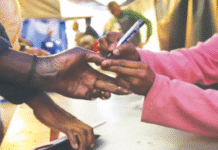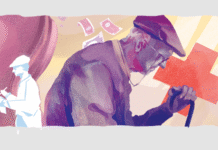
It is characteristic of India’s Prime Minister Narendra Modi that he managed to turn an occasion intended to celebrate the birth of Bangladesh into an episode about himself. That may not have been how it is seen in Bangladesh, but that is how it is being seen in India, where his admirers and critics are busy debating what role Modi may have played in 1971. And a solemn occasion meant to mark the night the Pakistan army unleashed Operation Searchlight—with the arrest of Sheikh Mujibur Rahman and other leaders, accompanied by merciless killings on the Dhaka University campus and beyond, and the subsequent declaration of independence—has turned into a story about Modi.
There’s more: if you followed Modi’s visit on Indian media, you would see images of him visiting the Matua community and the Hindu temple in Orakandi, a move intended to sway votes in the ongoing elections in West Bengal. Few Indian media outlets spoke of the demonstrations against Modi’s visit or the deaths of a number of demonstrators. Pro-government networks will play up the Hefajat demonstrations and reports of attacks on Hindu temples since his visit, achieving the twin governmental objectives of arousing sympathy in India for Hindus in Bangladesh and offering the incidents as evidence why India’s new rules are needed, which grant fast-tracked citizenship to asylum seekers from neighbouring countries who are from religious minorities.
The new Indian policy flies in the face of international refugee law—India has historically abided by the refugee convention even though it is not a signatory. Essentially, the new rules mean that asylum seekers from Bangladesh who claim that they are persecuted on religious grounds would get citizenship quickly as long as they are not Muslim. (Muslim refugees aren’t prohibited; it is just that the process will take much longer.) India has indeed become less hospitable to refugees fleeing strife. Bureaucrats had instructed officials in the parts of India that border Myanmar to “politely” turn back Myanmar nationals wishing to cross the border, a decision reportedly revoked following criticism.
The arrival of foreigners in India’s northeast has historically been controversial, and politicians of Modi’s Bharatiya Janata Party (BJP) take a dim view of Bangladeshis. BJP leaders have used dehumanising terms in describing undocumented people. Infiltrators is a mild word they use—Home Minister Amit Shah has once referred to them as “termites”. Anyone suspected of being a foreigner in those parts—and more so, if he is Muslim—is assumed to be a Bangladeshi. Sending them back to Bangladesh, somehow, is a major preoccupation for the government, and there is a vociferous lobby—particularly on social media—which eggs on the government to do more.
The central problem is that some in the BJP see Bangladesh as another Pakistan in the east. That shows a profound misunderstanding of Bengali nationalism as well as Bangladeshi identity, where the faith and the language are intertwined. And when asked if they are Bengali or Muslim, most Muslim Bangladeshis would say “both,” as in Tarfia Faizullah’s remarkable poem. The BJP chooses to ignore that, or fails to see that. In either case, it draws the wrong conclusions.
The Jana Sangh (the predecessor to the BJP) demonstrations in August 1971 were partly protesting the Indo-Soviet accord, and partly demanding instant recognition of Bangladesh. That demand was naïve; had India recognised Bangladesh in August, Pakistan would have seen it as an act of war. And the Indian army was reluctant to engage Pakistan during the torrential tropical monsoon, particularly on the eastern front. But the Jana Sangh demonstrations also served Indira Gandhi’s interests; she could convince the international community that the refugee crisis, and indeed the mass violence against civilians in what was then still East Pakistan, were becoming untenable, as she built global opinion against Pakistan’s brutality.
True, there are newspaper clippings that show that there were demonstrations in Delhi, and that some demonstrators were from Gujarat, and that some were briefly detained (there is a video clip circulating showing Jana Sangh activists boarding a bus in an orderly manner as they are being arrested and shouting slogans, looked on by amused police officers)—and Modi could be one of them. But we do not yet know if he was indeed among the detained individuals, or if he was jailed in the Tihar prison. On social media, Modi’s supporters have offered the evidence in the form of the back jacket of Modi’s 1978 book Sangharshma Gujarat (Gujarat’s struggle), where the author’s biography says Modi had been to Tihar jail for demonstrating over Bangladesh. I read the book in its original, as did two other people I know; the book is about the 19-month emergency (1975-1977) when Indira Gandhi had suspended key provisions of the constitution, jailed opposition politicians, imposed press censorship, and curbed liberties. The book has no reference to the 1971 demonstrations. Furthermore, a 2019 biopic about Modi too did not include the incident. Since it is the only time Modi is believed to have been arrested, one would think a director would want to show some dramatic scenes of the arrest in the film.
And yet, it is a clever assertion, because it is always difficult to refute what may not have happened—and there is always the possibility that for a few hours, or perhaps a day or two, the 20-year-old Modi was the state’s “guest”.
For a public figure, Modi’s biography has had curious gaps: for many years he did not reveal his marital status in election declarations, and there is little evidence that Gujarat University offered a course in “entire political science”, the topic he claims to have studied and graduated in. To that, add his youthful activism. But those gaps are irrelevant; they’ve served their intended purpose. Regardless of whether it happened, the story embellishes Modi’s image of having been on the right side of the argument during a conflict in which India was on the right side of history. That shows good intent and Bangladeshis should feel happy about it. As for his specific actions, of what his administration does to those suspected of being Bangladeshis in India, well, that is a different matter.
Salil Tripathi is the author of “The Colonel Who Would Not Repent: The Bangladesh War and its Unquiet Legacy” (Aleph, 2014). He lives in New York.









